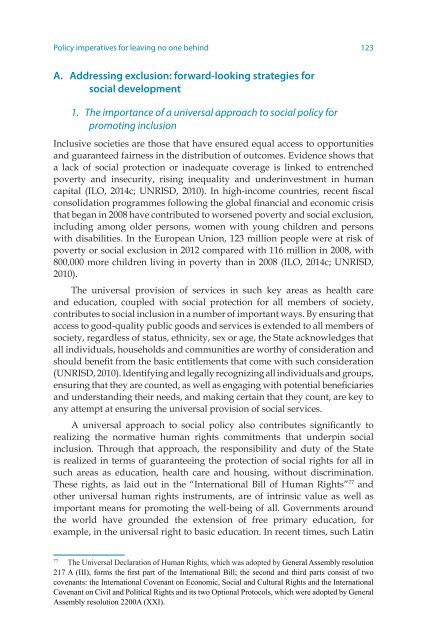Leaving no one behind the imperative of inclusive development
full-report
full-report
Create successful ePaper yourself
Turn your PDF publications into a flip-book with our unique Google optimized e-Paper software.
Policy <strong>imperative</strong>s for leaving <strong>no</strong> <strong>one</strong> <strong>behind</strong> 123<br />
A. Addressing exclusion: forward-looking strategies for<br />
social <strong>development</strong><br />
1. The importance <strong>of</strong> a universal approach to social policy for<br />
promoting inclusion<br />
Inclusive societies are those that have ensured equal access to opportunities<br />
and guaranteed fairness in <strong>the</strong> distribution <strong>of</strong> outcomes. Evidence shows that<br />
a lack <strong>of</strong> social protection or inadequate coverage is linked to entrenched<br />
poverty and insecurity, rising inequality and underinvestment in human<br />
capital (ILO, 2014c; UNRISD, 2010). In high-income countries, recent fiscal<br />
consolidation programmes following <strong>the</strong> global financial and eco<strong>no</strong>mic crisis<br />
that began in 2008 have contributed to worsened poverty and social exclusion,<br />
including among older persons, women with young children and persons<br />
with disabilities. In <strong>the</strong> European Union, 123 million people were at risk <strong>of</strong><br />
poverty or social exclusion in 2012 compared with 116 million in 2008, with<br />
800,000 more children living in poverty than in 2008 (ILO, 2014c; UNRISD,<br />
2010).<br />
The universal provision <strong>of</strong> services in such key areas as health care<br />
and education, coupled with social protection for all members <strong>of</strong> society,<br />
contributes to social inclusion in a number <strong>of</strong> important ways. By ensuring that<br />
access to good-quality public goods and services is extended to all members <strong>of</strong><br />
society, regardless <strong>of</strong> status, ethnicity, sex or age, <strong>the</strong> State ack<strong>no</strong>wledges that<br />
all individuals, households and communities are worthy <strong>of</strong> consideration and<br />
should benefit from <strong>the</strong> basic entitlements that come with such consideration<br />
(UNRISD, 2010). Identifying and legally recognizing all individuals and groups,<br />
ensuring that <strong>the</strong>y are counted, as well as engaging with potential beneficiaries<br />
and understanding <strong>the</strong>ir needs, and making certain that <strong>the</strong>y count, are key to<br />
any attempt at ensuring <strong>the</strong> universal provision <strong>of</strong> social services.<br />
A universal approach to social policy also contributes significantly to<br />
realizing <strong>the</strong> <strong>no</strong>rmative human rights commitments that underpin social<br />
inclusion. Through that approach, <strong>the</strong> responsibility and duty <strong>of</strong> <strong>the</strong> State<br />
is realized in terms <strong>of</strong> guaranteeing <strong>the</strong> protection <strong>of</strong> social rights for all in<br />
such areas as education, health care and housing, without discrimination.<br />
These rights, as laid out in <strong>the</strong> “International Bill <strong>of</strong> Human Rights” 77 and<br />
o<strong>the</strong>r universal human rights instruments, are <strong>of</strong> intrinsic value as well as<br />
important means for promoting <strong>the</strong> well-being <strong>of</strong> all. Governments around<br />
<strong>the</strong> world have grounded <strong>the</strong> extension <strong>of</strong> free primary education, for<br />
example, in <strong>the</strong> universal right to basic education. In recent times, such Latin<br />
77<br />
The Universal Declaration <strong>of</strong> Human Rights, which was adopted by General Assembly resolution<br />
217 A (III), forms <strong>the</strong> first part <strong>of</strong> <strong>the</strong> International Bill; <strong>the</strong> second and third parts consist <strong>of</strong> two<br />
covenants: <strong>the</strong> International Covenant on Eco<strong>no</strong>mic, Social and Cultural Rights and <strong>the</strong> International<br />
Covenant on Civil and Political Rights and its two Optional Protocols, which were adopted by General<br />
Assembly resolution 2200A (XXI).
















